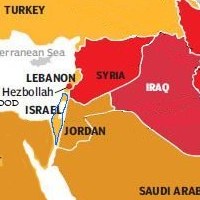![]()
Sun, July 24, 2011 | The Meir Amit Intelligence and Terrorism Information Center

Iranian Prime Minister Mahmoud Ahmadinejad (left) shakes hands with Sergei Labrov as Mouchehr Mottaki looks on (Oct 31, 2007)
Iranian reservations over Russia’s “step-by-step” program for resumption of nuclear talks
The “step-by-step” program for the resumption of nuclear talks between Iran and the West, brought up last month by Russia’s Foreign Minister Sergey Lavrov during a visit to Washington, was met with reservations from Iran. According to the Russian proposal, Iran will address step by step the questions brought up by the IAEA, and be rewarded along the way by the gradual removal of the sanctions imposed on it. According to the proposal, Iran will first be required to address “easy” questions, followed by ones that are more “difficult”.
So far Iran has issued no official response to the proposal. At his weekly press conference, Foreign Ministry Spokesman Ramin Mehmanparast said that Iran has yet to receive the Russian proposal, and that it will examine it once the proposal has been received (Mehr, July 19). However, Majles National Security and Foreign Policy Committee Chairman Ala’eddin Boroujerdi said that the Russian proposal would send the talks back to square one, as Iran has already answered all questions about its nuclear program. He had praise for Russia’s positive approach and its attempt to remove the obstacles supposedly placed by the West with regard to the nuclear program, but argued that the proposal does not constitute a proper solution. He suggested that Western countries go back to the answers already provided by Iran to questions on its nuclear program to “refresh their memory” about the fact that its nuclear program is designed for peaceful needs (Press TV, July 16).
Majles member Mohammad Karami-Rad also had reservations about the Russian proposal, saying that Iran is unwilling to accept new conditions for the resumption of the talks. He said that Russia is trying to ease the way for the advancement of Western interests by resuming the nuclear negotiations with Iran (Press TV, July 16).
Tabnak, a website affiliated with the pragmatic conservative bloc, also voiced reservations concerning the Russian proposal. An editorial published by the website said that the Russian proposal fails to entertain the possibility that, once again, Iran’s answers may not satisfy the West. The website warned that, in that case, Russia may join the West in tightening sanctions against Iran, and that the proposal is designed to set the stage for building a global consensus against it. The website warned that if, for instance, Iran answers 8 of 10 questions to the satisfaction of the West, it is not unlikely that the two remaining questions will be used to impose additional sanctions against it.
It is not clear, the article said, whether the Russian proposal is also designed with Iran’s interests in mind, or is it aimed to play a part in the global power struggle or Russia’s domestic political power struggles. As long as the precise details of the proposal have not been made clear, it cannot be given serious consideration.
The website suggested that the Iranian administration, including the Foreign Ministry, the Supreme National Security Council, and the Majles National Security and Foreign Policy Committee, hold talks with the Russian administration to obtain more information about the proposal, which would make it possible to safeguard Iran’s national interests (Tabnak, July 16).
The conservative daily Mellat-e Ma claimed that the Russian proposal was made when it became clear that the international sanctions against Iran failed, and also in light of the developments in the Arab world, which turned the Iranian nuclear program into an issue of secondary importance on the international agenda. According to the daily, Iran’s determination to continue with its nuclear program and its resistance to the international sanctions are cause for concern in the West, particularly in the U.S. The West is therefore trying to pose repeated questions on the nuclear program by bringing up the Russian proposal.
The daily warned that the Russian proposal may reawaken the international PR atmosphere against Iran, and reposition the Iranian nuclear program on the international agenda. Iran’s diplomacy with regard to this issue must therefore be cautious, ensuring that if talks are held on the Russian proposal, they are based on recognition of Iran’s rights and national interests (www.mellatonline.ir, July 18).



 RSS
RSS










Iranian reservations over Russia’s “step-by-step” program for resumption of nuclear talks | #Russia #Iran #Nuclear http://bit.ly/ntlqCs
Iranian reservations over Russia’s “step-by-step” program for resumption of nuclear talks | #Russia #Iran #Nuclear http://bit.ly/ntlqCs
Iranian reservations over Russia’s “step-by-step” program for resumption of nuclear talks | #Russia #Iran #Nuclear http://bit.ly/ntlqCs
Iranian reservations over Russia’s “step-by-step” program for resumption of nuclear talks | #Russia #Iran #Nuclear http://bit.ly/ntlqCs